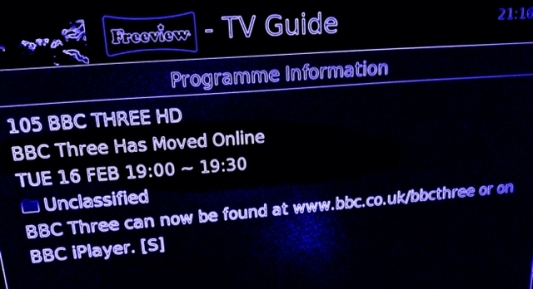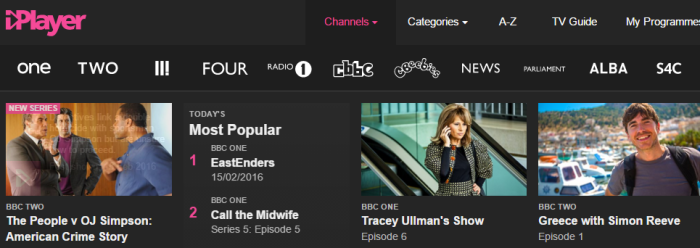Archive for February 2016
BBC Three moving online is a massive audience gamble
Not quite gone, not yet
By the time you read this, the television part of BBC 3 will be dead.
The reasons are well documented: the UK Government – which controls the BBC’s funding – has effectively cut the BBC’s budget by 25% over the last six years.
Imagine your income dropping by a quarter, what you would stop doing? Eating out? Buy fewer new clothes? Spend less on media?
The BBC is cutting right across the board. For instance, while the BBC 3 decision has been getting all the attention there are significant cuts to other youth services. Radio 1 live events coverage has been slashed by over 80%.
BBC 3’s TV stats are very good. It gets nearly a quarter of the UK 16-34 age group watching every week, for well over 2 hours. It has the 2nd highest audience appreciation rating, just behind BBC 4. That is an enormous amount of attention that has just been abandoned.
BBC 3’s problem now is to remain discoverable by its audience, and that’s a huge, huge challenge.
With so much choice available to the target audience this is an out-of-sight, out-of-mind problem. We are decades into a multi-channel TV world but most people watch fewer than 17 channels regularly (US data). Similarly the number of close friends you have in the real world is around 15.
In a post-TV environment BBC 3 is planning its own smartphone application, separate from the main iPlayer one. This is sensible, it needs a big bold front page and you can see above iPlayer has too many different brands to represent as it is.
However the human usage limits of TV channels also apply to apps.
You probably have dozens on your phone, but how many do you regularly use? Again, US data suggests only around 25, although the time you spend using them is increasing, but it’s nowhere near TV watching hours.
Our media usage is limited because there’s a limit to the amount of information your brain can process, and the number of hours in the day aren’t increasing.
Which is why I think losing the TV part of this brand is an enormous risk. The advantage of having the anchor of a TV channel is that it is still a useful way to stand out. Even if you don’t watch it (although the stats say millions do) seeing it on the EPG, or encountering it during a channel flick reminds you that it exists.
By going online-only BBC 3 is competing with every other piece of content on the internet, and there’s a lot more internet than there is BBC 3.
I’m being picky here, but the recent name / logo change doesn’t help. When personal referral is so important, how do you expect people new to the brand to tell their friends, when the mark is unpronounceable?
Question: ‘Where did that come from?
Answer: ‘It’s on the line-line-exclamation-mark channel on YouTube’. Not helpful.
Getting your audience to remember you are there is most of the battle, and unfortunately, due to constant media noise, it’s a battle you can’t stop fighting lest something new comes along to distract your audience.
Getting someone to install an app on their phone is one thing. Getting them to remember to use it regularly is quite another.
Our brains are hard-wired to pay attention to new things and the brain rewards us with feel-good chemicals. To make this worse, we also suffer from recency bias: the brain puts more importance on new things when making decisions.
For marketing budgets, its expensive to acquire a new customer and you have to keep spending to retain them. I predict BBC 3 is going to have to spend far more on external advertising than it thinks it does if it’s going to keep its audience share the way it is.
Unfortunately that is more money not being spent on programmes, precisely the opposite of what the corporation wants.

